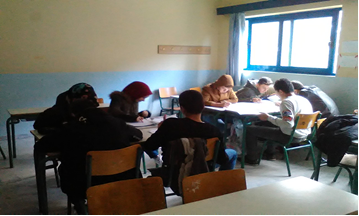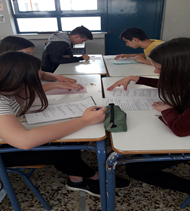
Ενισχυτικά μαθήματα 2017-2019
Μαθήματα 2018-2019
Μαθήματα διδακτικής στήριξης για 250 περίπου μαθητές και μαθήτριες δευτεροβάθμιας εκπαίδευσης πραγματοποιούνται φέτος στους νέους χώρους των ΚΕΣΠΕΜ στην Ξάνθη αλλά και στο Μειονοτικό Ιάσμου, στο Εσπερινό Λύκειο της Κομοτηνής, στο Γ΄ Γυμνάσιο Αλεξανδρούπολης και στο Γυμνάσιο Σουφλίου. Οι μαθητές/τριες, μετά την ολοκλήρωση του σχολικού προγράμματος, παρακολουθούν μαθήματα νέας ελληνικής γλώσσας και λογοτεχνίας, αρχαίας ελληνικής γλώσσας και αρχαίας ελληνικής γραμματείας, μαθηματικών και φυσικών επιστημών με τη βοήθεια ηλεκτρονικών υπολογιστών και εκπαιδευτικού υλικού του Προγράμματος. Παράλληλα τα παιδιά συμμετέχουν σε δραστηριότητες και ποικίλα δρώμενα που τα βοηθούν να αποκτήσουν αυτοπεποίθηση και να αναπτύξουν τις δεξιότητές τους.
Μαθήματα 2017-2018
Μέχρι να λειτουργήσουν οι χώροι των ΚΕΣΠΕΜ τα μαθήματα διδακτικής στήριξης για 388 μαθητές και μαθήτριες δευτεροβάθμιας εκπαίδευσης πραγματοποιούνται σε 8 σχολεία των νομών Ροδόπης και Ξάνθης, Γυμνάσια, Λύκεια ακόμη και Μειονοτικά Δημοτικά Σχολεία (2ο, 4ο και 6ο Γυμνάσιο Ξάνθης, Μ/κο Κενταύρου, 3ο Γυμνάσιο Κομοτηνής, Μ/κο Ιάσμου και Διαπολιτισμικό Γυμνάσιο-Λύκειο Σαπών). Οι μαθητές/τριες, μετά την ολοκλήρωση του σχολικού προγράμματος, παρακολουθούν μαθήματα νέας ελληνικής γλώσσας και λογοτεχνίας, αρχαίας ελληνικής γλώσσας και αρχαίας ελληνικής γραμματείας, μαθηματικών και φυσικών επιστημών. Τα μαθήματα αυτά εκτός από τη στήριξη στις σχολικές υποχρεώσεις των παιδιών τα βοηθούν να ενισχύσουν την αυτοπεποίθησή τους και την ικανότητά τους να ερευνούν και να ανακαλύπτουν μόνοι/ες τους, μέσα από κατάλληλες πηγές και με κατάλληλες μεθόδους.


Όλα σχεδόν τα μαθήματα επανασχεδιάζονται σε μια πιο παιγνιώδη μορφή, έτσι ώστε να είναι ελκυστικά για τους μαθητές και τις μαθήτριες και να αντισταθμίζουν την κόπωση που συνοδεύει το τέλος της σχολικής μέρας. Ενδεικτικά, τα παιδιά του Γυμνασίου εξοικειώνονται με την τραγωδία της «Ελένης» με προβολή βίντεο, φτιάχνουν ομάδες εργασίας και παιχνίδια ερωτήσεων για την «Οδύσσεια», δημιουργούν σκίτσα και γράφουν ιστορίες για τα φαινόμενα της Φυσικής και αξιοποιούν το διαδίκτυο για την καλύτερη κατανόηση των φυσικών φαινομένων. Επιπλέον, παρακολουθούν ντοκιμαντέρ για την εκπαίδευση σε άλλες χώρες ως ερέθισμα για την παραγωγή γραπτού λόγου. Στόχος των μαθημάτων πέραν από τη στήριξη στις σχολικές υποχρεώσεις των μαθητών και των μαθητριών είναι να συμβάλουν στην ενίσχυση της αυτοπεποίθησής τους και της ικανότητας να ερευνούν και να ανακαλύπτουν τη γνώση μέσα από τις κατάλληλες πηγές και τις
κατάλληλες μεθόδους.
Ενισχυτική διδασκαλία κατά τη διάρκεια των εξετάσεων (καλοκαίρι 2018)
Μαθήματα προετοιμασίας ταυτόχρονα με τις εξετάσεις Ιουνίου σχεδιάστηκαν για το Λύκειο. Με δεδομένο ότι οι προαγωγικές και απολυτήριες εξετάσεις των Λυκείων ολοκληρώθηκαν (α΄ εξεταστική) στις 12 Ιουνίου, ενώ τα αποτελέσματα της β΄ εξεταστικής εκδόθηκαν στα τέλη Ιουνίου, μαθήματα, θεωρητικά (φιλολογικά) και θετικά (μαθηματικά, φυσική και χημεία) στους νομούς Ξάνθης και Ροδόπης, προσφέρθηκαν στους μαθητές από την 1η έως την 11η Ιουνίου.
Τέσσερεις φιλόλογοι ασχολήθηκαν με την προετοιμασία των μαθητών του Λυκείου (σε Ξάνθη και Ίασμο, σε Κομοτηνή και Σάπες) προσφέροντας επαναληπτικά μαθήματα σε Ιστορία, Λογοτεχνία, Γλώσσα, Έκθεση και Αρχαία. Ταυτόχρονα δύο μαθηματικοί και μία φυσικός παρέδωσαν Μαθηματικά, Φυσική και Χημεία, σε τμήματα της Α΄ και Β΄ Λυκείου στην Ξάνθη και της Α΄ Λυκείου στον Ίασμο. Η συμμετοχή των μαθητών υπήρξε μεγάλη.
Internal Assessment of the Compensatory Teaching at Secondary Schools (2010-2013)
The organization, the progress of implementation and the results of the compensatory classes that took place at secondary and high schools in the three prefectures of Thrace for the period 2010-2013, are recorded in detail and are evaluated within the internal assessment of the Program.
Αποτελέσματα της πιλοτικής εφαρμογής
Η οργάνωση, το περιεχόμενο και τα αποτελέσματα της πιλοτικής εφαρμογής των εκπαιδευτικών υλικών του Προγράμματος σε γυμνάσια των νομών Ξάνθης και Ροδόπης καταγράφονται αναλυτικά και αξιολογούνται στο πλαίσιο της εσωτερικής αξιολόγησης του Προγράμματος για την περίοδο 2010-13.
· Συνολική έκθεση αξιολόγησης των αποτελεσμάτων της πιλοτικής εφαρμογής των εκπαιδευτικών υλικών (Δεκέμβριος 2011 - Μάιος 2013)
Εκθέσεις αξιολόγησης της πιλοτικής εφαρμογής των εκπαιδευτικών υλικών ανά μάθημα
· Έκθεση αξιολόγησης για το μάθημα της Λογοτεχνίας
· Έκθεση αξιολόγησης για το μάθημα της Ιστορίας
· Έκθεση αξιολόγησης για το μάθημα των Φυσικών Επιστημών
Η πιλοτική εφαρμογή των εκπαιδευτικών υλικών του Προγράμματος για την εκπαίδευση των παιδιών της μουσουλμανικής μειονότητας στη Θράκη σε Γυμνάσια των Νομών Ξάνθης και Ροδόπης οδήγησε στην παραγωγή πρωτότυπων διδακτικών σεναρίων, τα οποία αποτελούν ολοκληρωμένες διδακτικές προτάσεις.
Τα σενάρια είναι παραδειγματικές διδασκαλίες σχεδιασμένες επί χάρτου που είτε έχουν πραγματοποιηθεί είτε προτείνεται να πραγματοποιηθούν από τους εν ενεργεία και όχι από εξιδανικευμένους εκπαιδευτικούς.
Κάθε σενάριο περιλαμβάνει το περιεχόμενο της διδασκόμενης ενότητας, τους σκοπούς, τη συμβατότητα με το ισχύον Αναλυτικό Πρόγραμμα του μαθήματος, τα εργαλεία που χρησιμοποιήθηκαν, το εκπαιδευτικό υλικό (έντυπο, ηλεκτρονικό ή άλλο), αναλυτική παρουσίαση των επιμέρους φάσεων της διδακτικής διαδικασίας και τις μορφές αξιολόγησης των μαθητών και μαθητριών.

Δείτε εδώ:
Α) Αναλυτική παρουσίαση της Πιλοτικής εφαρμογής ανά μάθημα:
Ελένη Χοντολίδου, Πιλοτική εφαρμογή του μαθήματος της λογοτεχνίας
στο πλαίσιο του Προγράμματος Μουσουλμανοπαίδων
Β) Ορισμένα από τα διδακτικά σενάρια που δημιούργησαν οι εκπαιδευτικοί που συμμετείχαν στην πιλοτική εφαρμογή
Για το μάθημα της Λογοτεχνίας
- Μαρία Αλεξίου, Στάσεις ζωής στα ποιητικά κείμενα: Όσο μπορείς του Κ. Π. Καβάφη (Γ' γυμνασίου)
- Ελπινίκη Μουτίδου, Το ταξίδι στη λογοτεχνία: πραγματικότητα και ουτοπία (Β' γυμνασίου)
- Ζωή Μπάρμπα, Το Ταξίδι εμπειρία ζωής και εμπειρία ανάγνωσης (Β' γυμνασίου)
- Φωτεινή Νεστορίδου, Η σχολική ζωή μέσα από τα κόμικς (Α' γυμνασίου)
- Αντώνης Στεργίου, Η ουτοπία της επιστροφής: Η τελευταία αρκούδα του Πίνδου του Δημήτρη Χατζή (Γ' γυμνασίου)
- Ελένη Χατζή, Πορτρέτα μαθητών χτες και σήμερα (Γ' γυμνασίου)
At the secondary education level, the Project organizes:
In addition to the pupils of secondary schools, the people who have worked (or still are working in the 2013-14 school year) in the pilot implementation of the educational materials for Literature, History and Natural Sciences, are the following:
(a) For the implementation in the classrooms:
Maria Alexíou, Sophía Anastasiádou, Nikólaos Bakópoulos, Zoe Bárba, Yorgos Demertzídis, Aléxandros Dimarás, Anna Efstathiádou, Eleni Hatzí, Kikkí Ioannídou, Efthymía Karapoúli, Dímitra Katáki, Alexandra Kítsou, Sotírios Makrís, Georgrios Marétis, Elpiníki Moutídou, Fotiní Nestorídou, Phótis Photiádis, Konstantínos Rízos, Konstantínos Saríkas, Antónis Stergíou, Geórgios Triantaphyllídis, Athanásios Tsadaklís, Sotíris Veranoúdis, Katerina Vouyouklí, Yerakína Zafiríou.
(b) For the supervision of the work in the field:
Christos Daniil, Yorgos Épsimos, Christos Gontzaridis, Vasilikí Sakká, Konstantina Tsené
(c) For the scientific organization and overall supervision of the action
Venetía Apostolídou, Helenē Chontolidou, Vasílis Tsáfos, Vasílis Tselfés.
The scientific coordinator of the entire action is Vasilis Tselfés
Pilot Implementation of the Educational Materials for Literature, History, and Natural Sciences at Secondary Schools in Thrace
Description
The Project for the Education of the Muslim Minority in Thrace has prepared and produced, since 2004, educational materials for secondary school pupils in the subjects of Greek Language, Literature, Mathematics, History and Natural Sciences. These materials have been approved by the Ministry of Education’s Pedagogical Institute and been used successfully in the Compensatory Classes for Minority pupils. With the passing of time, however, some changes took place in the characteristics of compulsory education in Greece. Two of these changes, inextricably linked to the educational philosophy of the “New School” (the Education Ministry’s new strategy for the way schools should function), are: (a) The use of multiple sources of content, and (b) the differentiated approaches within the framework of learning and teaching.
Thus, when the current phase of the Project was being planned, it was deemed appropriate to include in its actions a pilot implementation that involved using in the regular curriculum some of the educational materials that were initially intended to be used only in compensatory classes, since
A. these materials can be utilized as alternative sources of content for the implementation of the regular school curriculum,
B. they can inspire differentiated strategies in the teaching of the pupil populations (that are ethnoculturally differentiated anyway) in the classes in the secondary schools of Thrace,
C. they can “train” teachers in the use of multiple sources of content and help them come up with differentiated teaching activities and/or scenarios, thus contributing to the teachers’ further professional development.
The pilot implementation started in January 2012 and will be completed at the end of the 2013-2014 school year.
Based on the data gathered and assessed so far for these three subjects, there emerge three significant findings and one commitment:
A. The quality of the educational materials for all three subjects is assessed positively, because it appears that the users of the materials, teachers and pupils, can easily adjust them to their needs. It appears, in other words, that the materials first inspire trust in the educational principles that they promote and then unleash the creativity of their users. With these dynamics, the educational materials of the Project show an in-built capability to “self-renew” -- a characteristic that fights the routine of the classroom, leading to good learning outcomes, while at the same time boding well for the materials’ long-term viability and making them suitable to be used in teacher-to-teacher communications.
B. The teachers who participate in the pilot implementation have shown that they can improvise and modify the existing materials. They search for additional sources and are not afraid to use innovative teaching approaches in their classes. They are confident in their ability to improve their teaching and the performance of their pupils. They function as perceptive observers of themselves and of their pupils. In addition, and in short, through this implementation, they have developed into teachers-researches who are capable, to a smaller or a larger degree, each in a different way, to communicate their work to the educational community and to receive feedback from it.
C. The whole experience of the pilot implementation has proven to be unique (it involves supervision of teacher’s work on a regular basis for two years, meetings in groups, production and exchange of materials, sharing teaching suggestions, etc.) It has been an experience that validates the significance of systematically pilot testing in the field any program of studies and/or any educational materials. It has shown that a certain amount of time is necessary for positive outcomes, and it has also demonstrated the need for the participants’ commitment. This commitment can get strengthened internally by the quality and the positive outcomes of the implementation itself.
The aforementioned commitment has extensions in the planning of the Project: The Project is committed to disseminate the outcomes and the philosophy of this educational pilot implementation, by organizing some actions during the current school year, and after it’s over, through conferences, through articles to be published in scientific journals, through posts on the internet, etc.
Samples from the work that is being done within the framework of the pilot implementation were presented at the Educational Symposium entitled “Innovative Practices in the education of Minority Children in Thrace” that was held on October 5-7, 2012, in Komotini.
See, for instance:
Trying New Teaching Practices for the History Classes

ΑΞΟΝΑΣ ΠΡΟΤΕΡΑΙΟΤΗΤΑΣ: «ΒΕΛΤΙΩΣΗ ΤΗΣ ΠΟΙΟΤΗΤΑΣ ΚΑΙ ΑΠΟΤΕΛΕΣΜΑΤΙΚΟΤΗΤΑΣ ΤΟΥ ΕΚΠΑΙΔΕΥΤΙΚΟΥ ΣΥΣΤΗΜΑΤΟΣ»
ΕΠΙΧΕΙΡΗΣΙΑΚΟ ΠΡΟΓΡΑΜΜΑ «ΑΝΑΠΤΥΞΗ ΑΝΘΡΩΠΙΝΟΥ ΔΥΝΑΜΙΚΟΥ, ΕΚΠΑΙΔΕΥΣΗ ΚΑΙ ΔΙΑ ΒΙΟΥ ΜΑΘΗΣΗ»
ΕΘΝΙΚΟ ΚΑΙ ΚΑΠΟΔΙΣΤΡΙΑΚΟ ΠΑΝΕΠΙΣΤΗΜΙΟ ΑΘΗΝΩΝ
ΑΡΙΣΤΟΤΕΛΕΙΟ ΠΑΝΕΠΙΣΤΗΜΙΟ ΘΕΣΣΑΛΟΝΙΚΗΣ
Η πράξη συγχρηματοδοτείται από το Ευρωπαϊκό Κοινωνικό Ταμείο (ΕΚΤ) και από Εθνικούς πόρους
Υπουργείο Παιδείας, Έρευνας και Θρησκευμάτων
Η πράξη «Ένταξη και εκπαίδευση των μουσουλμανοπαίδων» εγκρίθηκε από την Ειδική Υπηρεσία Διαχείρισης Ε.Π. «Ανάπτυξη ανθρώπινου δυναμικού, εκπαίδευσης και διά βίου μάθησης» στις 16/9/2016 και θα ολοκληρωθεί στις 30/9/2019
Επιστημονική υπεύθυνη της πράξης είναι η Kαθηγήτρια του ΕΚΠΑ Θάλεια Δραγώνα
This website uses cookies to manage authentication, navigation, and other functions. Accessing our website, you agree that we can use these types of cookies.


